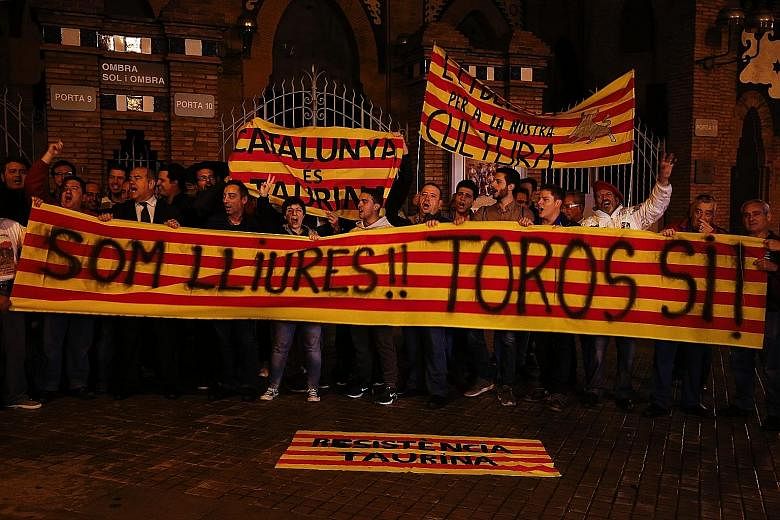MADRID • Spain's Constitutional Court has cancelled a bullfighting ban in Catalonia in what is likely to exacerbate tensions between Madrid and the separatist region and draw outcry from animal activists.
In a statement on Thursday, the court argued bullfighting was classified as part of Spain's heritage and, therefore, a decision on banning it was a matter for the central government and not for semi-autonomous regions. The ban has been declared "unconstitutional and void", it said.
The court decision is likely to increase already high tensions between Madrid and Catalonia, where the regional government is making moves to separate from Spain and has announced a referendum on the issue next year.
It drew immediate reactions from politicians on both sides of the divide. "In the Spanish state, it's unconstitutional to ban the public torture and murder of an animal. Enough said," tweeted Mr Gabriel Rufian, a Catalan separatist lawmaker in the national Parliament.
Ms Alicia Sanchez-Camacho, president of the Catalan branch of the ruling conservative Popular Party that took the ban to court, said she "welcomed" the decision. She tweeted that the party would "continue to defend" freedom and bullfighting.
Animal rights party Pacma criticised the decision as politically motivated. "Once more, they have been found to use animals in a political war," said party member Ana Bayle. "They don't know anything about animals, nor do they care."
Catalonia's Parliament voted to abolish bullfighting from Jan 1, 2012. It was the first region in mainland Spain to ban the tradition. Critics at the time also argued that Catalonia's ban was politically motivated.
Bullfighting has drawn increasing controversy and protests around Spain in recent years. While no other region has banned bullfighting since Catalonia made the move, Castile and Leon in Spain's north-west have abolished the killing of bulls at town festivals.
The move targeted the region's controversial Toro de la Vega festival, where horsemen chase a bull and spear it in front of onlookers.
Several cities have also put a stop to annual festivals with bull running over the years.
But supporters of bullfighting are not giving up without a struggle. They see bullfighting as an integral part of Spanish culture. Spain's first pro-bullfight lobbying group, the Bull Foundation, argued that it is beneficial for the economy, maintaining about 200,000 jobs.
Mr Simon Casas, a former matador, welcomed the court decision. "Bullfighting is a form of culture... It's an art form that is part of the identity of some people and it was totally absurd that a political institution, the Catalan government, was able to ban it."
Other controversial traditions involving animals, such as throwing a live goat off a tall church steeple to a crowd below, have been banned over the years.
But others continue to take place, such as placing inflammable balls on the horns of bulls, setting them on fire and letting the animals loose in the street.
AGENCE FRANCE-PRESSE

